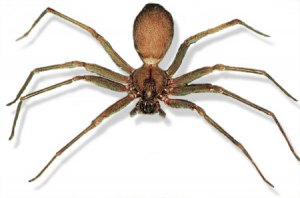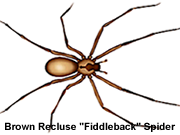

Brown Recluse Spider
location, identification, behavior, poison, bites treatment and first aid


location, identification, behavior, poison, bites treatment and first aid
When bitten by a brown recluse spider, it is important not to panic and stay calm. Being nervous actually allows the venom to spread inside the victim's body. Contact the nearest health center or hospital and seek immediate medical attention. You can also go to the nearest toxicology center near you. It is important to take note of the age of the victim, what time the spider had bitten the victim and the weight and the condition of the person. You should also be able to point the spot where you have been bitten. If it is possible to catch the spider that has bitten you, place it in a secured container or bottle so that it can be easily identified whether it is a brown recluse spider or not.
If the spider bite appears to be reddish and begin to get swollen, you can place an ice to lessen any pain but take note that excessive cold may add injury to the bite. You can also wash the entire area of the bite using soap and cool water - not warm water. Do not use tourniquets because it can only compress the area of the bite but you can use sterilized bandages.
To relieve pain caused by the bite, you can take anti inflammatory drugs as first aid treatment like naproxen or ibuprofen. Make sure that the victim does not do any abrupt movements or do any strenuous activities. The body part where the bite appears should always be above the victim's heart whenever possible. You can also take acetaminophen for pain relief.
Make sure that the area of injury is away from heat which can be a catalyst to tissue destruction. Do not put any type of unprescribed ointment to the area such as hydrocortisone cream or other steroid-based ointment without the approval from a doctor. Never use a suction device in the attempt of removing the venom or cut out the area of the skin where the bite appears.
Getting medical attention as soon as possible can help alleviate the symptoms of the bite and to make sure that the venom does not poison the entire body system. A hospital will get vital support so as to avoid further infections and other dangerous symptoms related to the bite.
At some point, the extraction of the necrotic tissue during the first days of the bite was believed to relieve certain symptoms but was later proved that doing so can actually delay treatment.